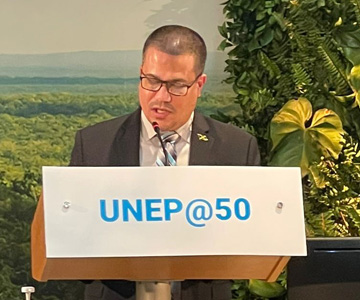
Statement from the Final day of UNEA-5.2
I had the opportunity to address the special plenary session of UNEA6 on the Occasion of the special session to commemorate the 50th anniversary of the creation of UNEP.
The Government & people of Jamaica extend congratulations to UNEP;
Excellencies, ladies and gentlemen, the Government and people of Jamaica extend congratulations
to the United Nations Environment Programe (UNEP) at this special session to commemorate its
fiftieth anniversary. UNEP is the major pillar of the UN Multilateral System’s case for society in
harmony with nature and has co-ordinated the worldwide effort to confront the planet’s biggest
environmental challenges.
For 50 years, UNEP has provided the necessary science-policy interface to allow for interdisciplinary
exchanges, with the ultimate objective of enhancing decision-making on the global environment
agenda.
The fiftieth anniversary celebrations provide an opportunity to reflect on the past and there have
been significant successes. But there have also been a number of critical targets that have been
missed, that the global community had previously committed to. Undoubtedly the next fifty years
will be similarly challenging, there are opportunities to define new pathways to success.
We would like to suggest 3 critical actions as part of the process of transformation and renewal.
Firstly, there must be all inclusive representation, including strong engagement from highly
vulnerable economies. Engagement processes, particularly at the national and local levels, have
proven to be inadequate to meet the goals originally established for the organization.
Secondly, there is need to simplify funding mechanisms that target scaled- up interventions at the
regional and sub-regional levels. This modality requires the strengthening of existing regional
coordinating bodies such as the UNEP Sub-regional office for the Caribbean; and the UNEP
Caribbean Environment Programmes Regional Coordination Unit (CAR RCU), Secretariat to the
Cartagena Convention. Jamaica hosts both entities which have played a significant role in regional
environmental governance, but could be more rigorous in effecting change at the policy level.
Thirdly, there is strong evidence of a gap between policy acceptance and implementation at the
national, regional and international levels. The strategic approach must therefore be focused on
how the Science-Policy Interfaces can be more solution-driven, implementable and equitable.
The triple planetary crisis of climate change, nature and biodiversity loss, and pollution can only be
addressed with unity of purpose and collective bold action. UNEP is uniquely positioned and has a
crucial role to play to reinvigorate international cooperation and spur collective action.
I again extend congratulations to UNEP on behalf of the GOJ, and invite the international community
to continue its support beyond this golden jubilee year.
